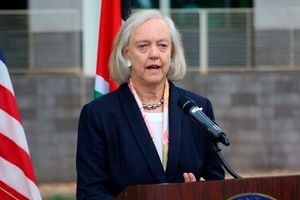Nine years on: The forgotten schoolgirls abducted by Boko Haram

Some of the schoolgirls abducted from the northeast Nigerian town of Chibok in April 2014. Some 110 Chibok girls remain unaccounted for to this day.
What you need to know:
- Isha Sesay’s book compassionately raises awareness of a tragedy largely ignored by the media.
- Boko Haram raided north-eastern Nigeria and kidnapped students, some of whom were released following negotiations.
Isha Sesay is the daughter of Kadi Sesay, a former Freetown senior English literature lecturer at the University of Sierra Leone.
After the 1996 coup d'état in the West African country, Kadi was appointed minister for development and economic planning. She was a fierce feminist and advocate for the advancement and protection of women and girls.
As part of her nation’s negotiating team in Lome, Togo, she secured a peace deal that marked the end of her country’s 11-year civil war, in 2002.
Kadi's skill-set emboldened her daughter, Isha, who worked at Sky Sports in London, then moved to Atlanta, Georgia, in 2005 as a correspondent for CNN International and CNN USA to host nightly show, CNN NewsCenter.
In 2014, she launched Women Everywhere Can Lead, a non-profit organisation. In the same year, she began compiling the compelling accounts of a tragedy that was largely ignored by the fourth estate. And this is how her book, Beneath the Tamarind tree: A story of Courage, Family and the Lost Schoolgirls of Boko Haram, came to be.

The cover of Isha Sesay's book: Beneath the Tamarind tree: A story of Courage, Family and the Lost Schoolgirls of Boko Haram.
From 2009, terrorist insurgent group Boko Haram, which translates into 'Western education is forbidden' in the Hausa dialect, had been kidnapping scores of women and girls across Nigeria’s northeast.
Some women and girls were snatched from the streets of the hometown of Maiduguri, the capital of Borno State, and Damaturu, the capital city of neighbouring Yobe State.
Boko Haram abductors launched 192 attacks in north-eastern Nigerian states of Borno, Yola and Adamawa from May 2013 to October 2014, murdering over 4,000 civilians.
The group had a misguided belief that women should remain uneducated and instead be committed to marriage and domesticity.
They championed the realisation of a society in which females are treated as sexual objects and secondary human beings that must be subservient to men.
The Government Girls Secondary School in Chibok had a cluster of nearly two-dozen single-story buildings with no running water and electricity.
In early March 2014, 391 boarding girls and 135 day-schooling boys were expected to begin their Senior School Certificate examinations.
Borno Governor Kashim Shettima, on the BBC Hausa Service, said state secondary schools would close because of Boko Haram attacks.
He later decided that the Government Girls Secondary School in Chibok stay open and serve as an exam centre to facilitate the school’s final-year students and those from neighbouring districts of Askira, Bama and Konduga. Mr Shettima, however, failed to provide adequate security at the new exam centre.
On April 15, 2014, past midnight, a heavily armed Boko Haram contingent of more than 300 men stormed the school. All the teachers had earlier fled, abandoning the girls when they heard sounds of rapid gunfire. The girls froze in fear, and in darkness.
Dressed in the standard camouflage Nigerian soldiers' uniforms, the Boko Haram battalion ordered the girls to assemble at the centre of the compound.
The girls began sobbing uncontrollably, but the terrorists were unmoved as they spoke in their dialect of Hausa and Kanuri. They set the classrooms and staff quarters on fire.
They then ordered the girls to get into a Mercedes-Benz truck, nicknamed 'Nine-Eleven' by the locals. The space wasn’t enough, so 100 girls followed on foot as small armoured trucks trailed them.
They slowly descended into Sambisa forest, an expansive enclave of ungoverned spaces that covered parts of four Nigerian states and bordered Niger, Chad and Cameroon. The harsh conditions of the Savannah made it extremely inhospitable.
Some 57 girls managed to secretly flee from the slow moving truck, into the bushes of Sambisa and found their way home.
After two days of an arduous journey, the rest reached a Boko Haram camp dominated by grass shacks. The girls were forced to sleep under a giant tamarind tree.
They were viciously assaulted with canes, suffered extreme starvation and deprivation and after five months they were moved to a house in Gwoza town in Borno State. Fifty of them were manipulatively converted to Islam and coerced into marrying Boko Haram militants.
Stress-related deaths
By the second anniversary of their abduction, more than a dozen hopeless parents of the missing girls had died from stress-related illnesses.
On October 13, 2016, over two-and-a-half years in captivity, the first frail group of 21 girls were released following negotiations between Boko Haram leader Shekau Abubakar, Nigerian humanitarian Zannah Mustapha and three Swiss negotiators.
Over four years after the abduction, on May 7, 2017, the Nigerian government announced on Twitter that another 82 Chibok girls had been set free. By now, a total of 107 girls had been rescued.
On September 15, 2017, the 107 girls were enrolled in the American University of Nigeria, Yola. Their school fees and monthly allowances were catered for by the federal government. However, 110 Chibok girls remain unaccounted.
Jeff Anthony is a novelist, Big Brother Africa 2 Kenyan representative and founder of Jeff's Fitness Centre (@jeffbigbrother).





